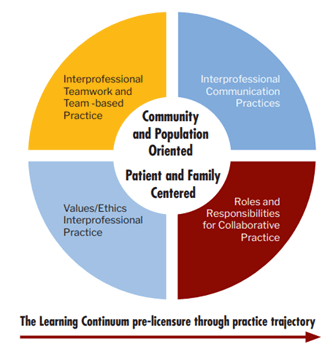Enhanced Patient Care/Outcomes: Through IPE, students learn to work collaboratively with professionals from diverse backgrounds, gaining a deeper understanding of each other's roles and skills. This understanding encourages a team-based/ patient-centered approach that not only addresses physical needs of patients, but also their emotional and social needs as well. This approach to patient care not only improves clinical outcomes but also enhances patient satisfaction and confidence in their care team.
Improved Communication Skills: Effective communication is essential in healthcare settings to ensure healthy teamwork and collaboration. IPE exposes students to interdisciplinary communication early in their education, encouraging skills in that improve their ability to convey complex ideas from their professional lens.
Improved Culturally Sensitive Care: IPE brings together students and professionals from various health and behavioral health disciplines, exposing them to different cultural backgrounds, beliefs, and practices. This exposure helps students gain a deeper understanding of diverse perspectives, which is essential for providing culturally sensitive care.
Evidence-based Practice Growth: Health and human service professionals rarely work in isolation. IPE prepares students for working as an active interdisciplinary team member and emphasizes evidence-based practice growth by highlighting the numerous benefits of interprofessional collaboration.
Increased Professional Job Satisfaction: Research has shown that health and human services professionals that work in an interdisciplinary care environment have greater professional confidence and greater job satisfaction. By working collaboratively with colleagues from various disciplines, individuals gain a sense of fulfillment and purpose, knowing that they are part of a cohesive team working towards common goals.

